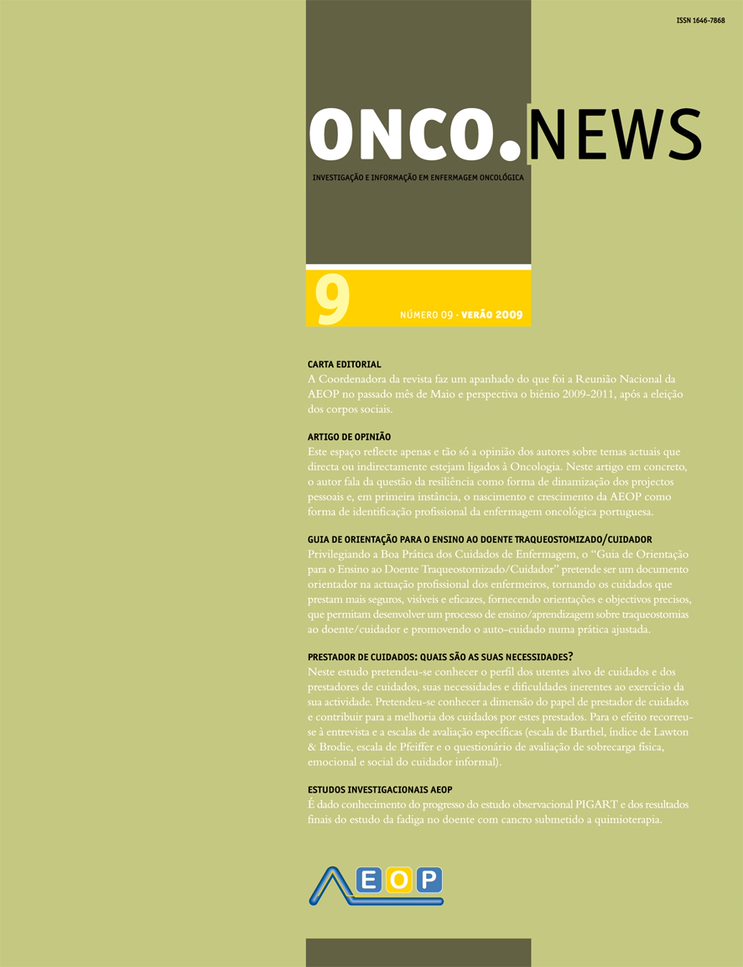Care provider: What are your needs?
DOI:
https://doi.org/10.31877/on.2009.09.02Keywords:
Aging, Formal and Informal Caregiver, Funcional DependenceAbstract
In developed countries, the high number of older people can’t be ignored. The increasing number of the oldest has social, economic and political consequences, and implicates a bigger need of long term cares.
This caretaking is provided by formal caregiver (health personal), and also by the informal caregiver (family and close friends of the patient). But the informal caregiver is the real support of dependent people.
The care quality depends on the degree of knowledge and profile of the informal care provider. The aim of this study is to know the patient and informal caregiver difficulties and needs, using the interview and specific scales (Barthel’s scale, Lawton and Brodie index, Pfeifer scale, Smilkstein Family Apgar and QASCI)
Our sample includes a sixty dependents and their informal care providers (33 rural; 27 urban). We verify that high dependent individuals of both sex, and the median age is 80 years old (50 years minimum and 96 years maximum), with high dependency degree for every day activities. The informal caregiver is usually a patient parent, female gender and the median age is 53 years old (31 years minimum and 80 years maximum). The youngest and more educated is observed in urban environment. The psychological pressure of the informal caregiver is high, so their doubts how to care are very usual. The ignorance about their rights and official resources available are common.
Downloads
References
Instituto Nacional de Estatística (2004) “Projecções de População Residente, Portugal e NUTS II, 2000-2050”, Instituto Nacional de
Estatística, Lisboa.
Rodriguez, B.E., Alvarez, E.D., Cartes, O.P. (2011) “Cuidadores Informales, Necessidades y Ayudas”. Revista Rol de Enfermeria, 24(3):183-9.
Moreira, I.M.P.B. (2001) “O doente terminal em contexto familiar”. Coimbra, Formasau – Formação e Saúde, Lda.
Lawton, M.P., Kleban, M.H., Moss, M., Rovine, M., Glicksman, A. (1989) “Measuring caregiving appraisal. Journal of Gerontology”: Psychological Sciences, 44:61-71.
Albert, S.M. (1992) “Psichometric investigation of a belief system: caregiving to the chronically ill parent”. Social Science Medicine, 35:
-709.
Instituto Nacionale de Serviços Sociales (1995) “Cuidados en la vejez: el apoyo informal”. Madrid. Ministério de Assuntos Sociales.
Albert, S.M., Brody, E.M. (1996) “When elder care is viewed as child care: significance of elder’s cognitive impairment and caregiver burden”. The American Journal of Geriatric Psychiatry, 4: 121-30.
Classificação Internacional para a Prática de Enfermagem CIPE/ICNP (2000). Versão Beta. Lisboa: IGIF.
Araújo, F., Ribeiro, J., Oliveira, A., Pinto, C. (2007) “Validação do índice de Barthel numa amostra de idosos não institucionalizados”. Revista
Portuguesa de Saúde Pública, 25(2): 59-66.
Martins, T., Ribeiro, J.P., Garrett, C. (2003) “Estudo de validação do questionário de avaliação da sobrecarga para cuidadores informais”.
Psicologia, Saúde & Doenças, 4(1):131-48.
Ferreira, F.A. (1990) “Moderna Saúde Pública”, 6ª ed., Lisboa: Fundação Calouste Gulbenkian.
Imaginário, C. (2002) “O idoso no contexto dependente em contexto familiar”. Lisboa. Formasau.
Rosa, M.J., Chitas, P. (2000) “Unidades e pluralidades da demografia portuguesa: perfis e dinâmicas concelhias, 1960-1961”. Lisboa.
Instituto de Ciências Sociais da Universidade de Lisboa.
Wright, L.M., Leahey, M. (2000) “Nurses and families – A guide to family assessment and intervention”. Philadelphia: Davis Company.
Swanson, K. (1991) “Desenvolvimento empírico de uma teoria do cuidar de médio alcance”. In: Nursing Research, 3:161-6.
Bliss, J. (2005) “What do informal carers need from district nursing services?” British Journal of Community Nursing, 11(6):251-54.
Bliss, J. (2005) “Working in partnership with adult informal carers”. British Journal of Community Nursing, 10(5): 233-5.
Christakis, N.A., Iwashyma, T.J. (2004) “The health impact of health care on families: a matched cohort study of hospice use by decedents
and mortality outcomes in surviving, widowed spouses” Social Science Medicine, 57:465-75.
García-Calvente, M., Mateo-Rodríguez, I., Eguiguren, A.P. (2004) “El sistema informal de cuidados en clave de desigualdad”, Graceta
Sanitária, 18 Suppl 1:132-9.
Aoun, S., Kristjanson, L. (2003) “The social impact of caring for terminally ill people: Sustaining the well-being of carers in rural Australia” National Rural Health Conference.
Downloads
Published
How to Cite
Issue
Section
License
Copyright (c) 2023 Cristina Pinto, Lúcio Santos

This work is licensed under a Creative Commons Attribution-NonCommercial-ShareAlike 4.0 International License.




